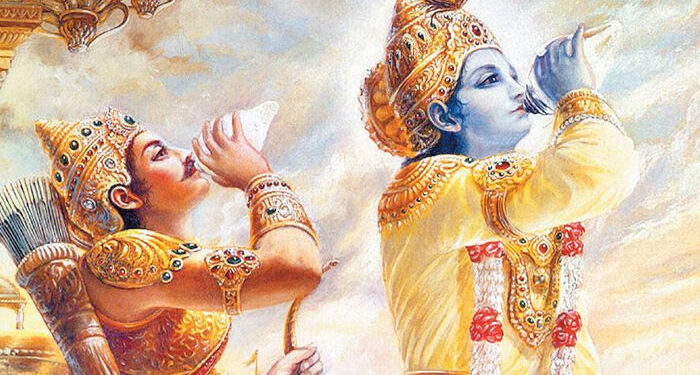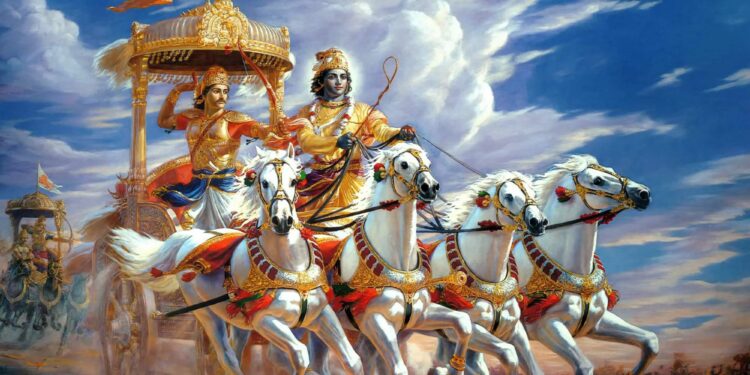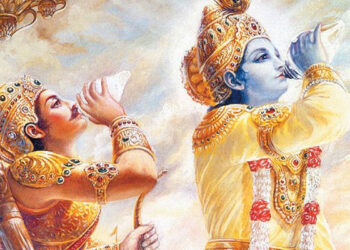TEXT 21
te taṁ bhuktvā svarga-lokaṁ viśālaṁ
kṣīṇe puṇye martya-lokaṁ viśanti
evaṁ trayī-dharmam anuprapannā
gatāgataṁ kāma-kāmā labhante
SYNONYMS
te—they; tam—that; bhuktvā—enjoying; svarga-lokam—heaven; viśālam—vast; kṣīṇe—being exhausted; puṇye—the results of their pious activities; martya-lokam—to the mortal earth; viśanti—fall down; evam—thus; trayī—of the three Vedas; dharmam—doctrines; anuprapannāḥ—following; gata-āgatam—death and birth; kāma-kāmāḥ—desiring sense enjoyments; labhante—attain.
TRANSLATION
When they have thus enjoyed vast heavenly sense pleasure and the results of their pious activities are exhausted, they return to this mortal planet again. Thus those who seek sense enjoyment by adhering to the principles of the three Vedas achieve only repeated birth and death.
PURPORT
One who is promoted to the higher planetary systems enjoys a longer duration of life and better facilities for sense enjoyment, yet one is not allowed to stay there forever. One is again sent back to this earth upon finishing the resultant fruits of pious activities. He who has not attained perfection of knowledge, as indicated in the Vedānta-sūtra (janmādy asya yataḥ), or, in other words, he who fails to understand Kṛṣṇa, the cause of all causes, becomes baffled about achieving the ultimate goal of life and is thus subjected to the routine of being promoted to the higher planets and then again coming down, as if situated on a Ferris wheel which sometimes goes up and sometimes comes down. The purport is that instead of being elevated to the spiritual world, from which there is no longer any possibility of coming down, one simply revolves in the cycle of birth and death on higher and lower planetary systems. One should better take to the spiritual world to enjoy an eternal life full of bliss and knowledge and never return to this miserable material existence.
TEXT 22
ananyāś cintayanto māṁ
ye janāḥ paryupāsate
teṣāṁ nityābhiyuktānāṁ
yoga-kṣemaṁ vahāmy aham
SYNONYMS
ananyāḥ—having no other object; cintayantaḥ—concentrating; mām—on Me; ye—those who; janāḥ—persons; paryupāsate—properly worship; teṣām—of them; nitya—always; abhiyuktānām—fixed in devotion; yoga—requirements; kṣemam—protection; vahāmi—carry; aham—I.
TRANSLATION
But those who always worship Me with exclusive devotion, meditating on My transcendental form—to them I carry what they lack, and I preserve what they have.
PURPORT
One who is unable to live for a moment without Kṛṣṇa consciousness cannot but think of Kṛṣṇa twenty-four hours a day, being engaged in devotional service by hearing, chanting, remembering, offering prayers, worshiping, serving the lotus feet of the Lord, rendering other services, cultivating friendship and surrendering fully to the Lord. Such activities are all auspicious and full of spiritual potencies, which make the devotee perfect in self-realization, so that his only desire is to achieve the association of the Supreme Personality of Godhead. Such a devotee undoubtedly approaches the Lord without difficulty. This is called yoga. By the mercy of the Lord, such a devotee never comes back to this material condition of life. Kṣema refers to the merciful protection of the Lord. The Lord helps the devotee to achieve Kṛṣṇa consciousness by yoga, and when he becomes fully Kṛṣṇa conscious the Lord protects him from falling down to a miserable conditioned life.


















